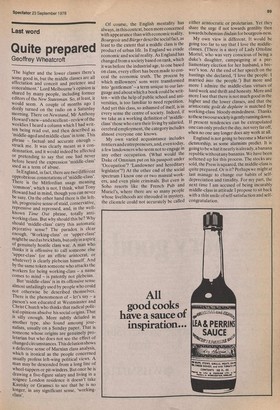Last word
Quite prepared
Geoffrey Wheatcroft
'The higher and the lower classes there's some good in, but the middle classes are all affectation and conceit and pretence and concealment.' Lord Melbourne's opinion is shared by many people, including former editors of the New Statesman. So, at least, it would seem. A couple of months ago I dozily turned on the radio on a Saturday morning. There on Newstand, Mr Anthony Howard's new— and excellent— review of the weeklies I heard a column which I had written being read out, and then described as middle-aged and middle-class' in tone. This phrase — factual and accurate enough — struck me. It was clearly meant as a condemnation, and it would indeed be affected or pretending to say that one had never before heard the expression 'middle-class' used as a term of abuse.
In England, in fact, there are two different Opprobrious connotations of 'middle-class'. There is the Mitfordian usage meaning common', which is not, I think, what Tony Howard had in mind, though you can never be sure. On the other hand there is the leftish, progressive sense of staid, conservative, repressive and repressed, and, in the wellknown Time Out phrase, totally antiworking class. But why should this be? Why should 'middle-class' carry this automatic Pejorative sense? The paradox is clear enough. 'Working-class' or 'upper-class' might be used as brickbats, but only in a spirit of genuinely hostile class war. A man who thinks it is offensive to call someone else Upper-class' (or an effete aristocrat, or whatever) is clearly plebeian himself. And by the same token someone who attacks the workers for being working-class — a name comes to mind — is patently not plebeian. But 'middle-class' is in its offensive sense almost unfailingly used by people who could not otherwise be described themselves. There is the phenomenon of — let's say — a parson's son educated at Westminster and Christ Church who thinks that radical political opinions absolve his social origins. That is silly enough. More subtly deluded in another type, also found amoung journalists, usually on a Sunday paper. That is someone whose origins are genuinely proletarian but who does not see the effect of changed circumstances. This delusion shows a defective sense of Marxian class analysis, Which is ironical as the people concerned usually profess left-wing political views. A man may be descended from a long line of wheel-tappers or pit-winders. But once he is drawing a five-figure salary and living in a soignee London residence it doesn't take i Kautsky or Gramsci to see that he s no longer, in any significant sense, 'workingclass'. Of course, the English mentality has always, in this context, been more concerned with appearance than with economic reality. Bourgeois and Barger describe social fact, as least to the extent that a middle class is the product of urban life. In England we evade economic and social reality. As England has changed from a society based on rank, which it was before the industrial age, to one based on class, every effort has been made to conceal the economic truth. The process by which millowners' sons were transformed into 'gentlemen' — a term unique to our language and about which a book could be written — with the help of public school and universities, is too familiar to need repetition. And yet this class, so ashamed of itself, is in every sense the centre of society. Indeed, if we take as a working definition of 'middleclass' those who earn their living by salaried, cerebral employment, the category includes almost everyone one knows. My own varied acquaintance includes rentiers and entrepreneurs, and, even today, a few landowners who seem not to engage in any other occupation. (What would the Duke of Omnium put on his passport under 'Occupation'? 'Landowner and hereditary legislator'?) At the other end of the social spectrum I know one or two manual workers, and even plain criminals. But even in Soho resorts like the French Pub and Muriel's, where there are so many people whose livelihoods are shrouded in mystery, the clientele could not accurately be called either aristocratic or proletarian. Yet they share the urge if not towards gentility then towards bohemian disdain for bourgeois-ness.
My own view is different. It would be going too far to say that I love the middleclasses. (There is a story of Lady Ottoline Morrel, who was very conscious of being a duke's daughter, campaigning at a parliamentary election for her husband, a brewer's son. At the end of her speech on the hustings she declared, 'I love the people. I married into the people.') But more and more I admire the middle-class virtues of hard work and thrift and honesty. More and morel see that there is not much good in the higher and the lower classes, and that the aristocratic goat de deplaire is matched by working-class bloody-mindedness. Thanks to these two our society isgentlyrunning down. If present tendencies can be extrapolated one can only predict the day, not very far off, when no one any longer does any work at all.
England is not going to become a Marxist dictatorship, as some alarmists predict. It is goingto be what it nearly is already, a banana republic without any bananas. We have been softened up for this process. The stocks are sold, the Press is squared, the middle-class is quite prepared. Or is it? Perhaps we might at last manage to change our habits of selfdepreciation and timidity. For my part, the next time I am accused of being incurably middle-class in attitude I propose to sit back with a thin smile of self-satisfaction and selfcongratulation.


































































































 Previous page
Previous page